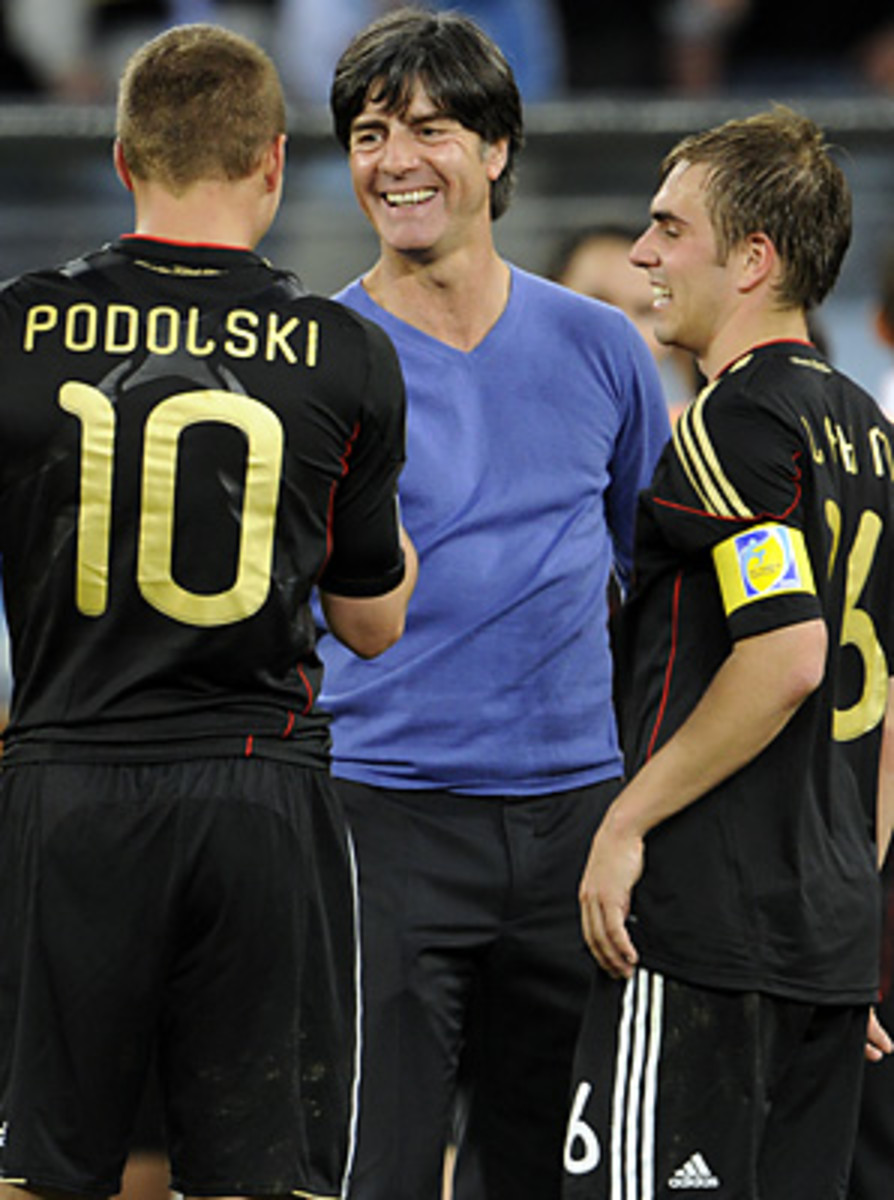German players surprise even themselves by crushing Argentina
CAPE TOWN -- Disbelief was the main reaction among the German press contingent in the Green Point stadium. Not surprise. Not amazement. Not even astonishment. It was utter disbelief.
Yes, there was a sense (or a promise, maybe?) that Germany could be good. Very good even. But, to paraphrase Frank Lampard, no one could have stood there and said that Germany were this good before, not 4-0 against Argentina good. "I've got goose bumps," said Bastian Schweinsteiger, the man of the match. "The whole of Germany is trembling," said Thomas Müller, "and rightly so. It's madness what just happened here. When you hammer Argentina 4-0, you're lost for words. It was another perfect team performance, we're all playing at our personal limit here."
Joachim Löw had so many players to single out, so much perfect application and tactical discipline to praise, he didn't seem quite sure where to begin. Strangely enough, he said the sort of thing that German managers have tended to say on these occasions in the past, but for very different reasons. "It was incredible how much willpower this team showed, how willing it was to do the really hard work," the 50-year-old coach said.
Willpower and hard work? Löw was selling his team deliberately short by concentrating on the old "German virtues," the default modus of every German team in past competitions, especially those who had problems stringing more than one pass together. The DFB coach was obviously trying to reign in the euphoria with his comments but then he quickly conceded that it wasn't really necessary. "The players were celebrating but there is no danger that they will go overboard emotionally. Most of them are already thinking ahead, towards the next game."
Löw, the CEO of the young "Germany 2010" startup, seemed almost happier to talk about Argentina's weaknesses -- "they're a split team in midfield, with offensive players who don't come back and one defensive player who doesn't create, " he said. But then the man whose contract with the German football federation expired on Wednesday and is yet to be extended allowed himself a hint of triumphalism.
"We decided to bring in many young players after the Euros," said Low. "We knew it would be risky, we knew we might lose one friendly or two. But we had confidence in the players. I told my players 'you are younger, faster and fitter than your opponents, they will have problems.' The transition has worked out."
That's a bit of an understatement, really. The whole of Germany is at his feet, grateful for much more than reaching the third semifinal in a row (in 2006, he was Jurgen Klinsmann's assistant): Löw has rebranded, nay: reconstructed the team into a side that neutrals enjoy watching. In doing so, he has fulfilled a deep-seated need of his countrymen: after being feared (war) and grudgingly respected for their achievements (post-war) they desperately wanted to be liked. And that doesn't just go for the soccer.
It's worth remembering that as a manager Löw has (only) won one German FA Cup and one Austrian championship before. As a player, he was nothing special, a record-goal scorer for second division SC Freiburg. His predecessors Franz Beckenbauer, Beti Vogts, Rudi Völler all won the World Cup as national team stars. "I want to be judged on results," he said before the tournament, when there were murmurings of discontent. Regardless of the outcome of Germany's next two games, however, South Africa 2010 has already been a resounding success and provided one or two important lessons. Firstly, experience is overrated. Secondly, "you can plan for success with hard work and the right philosophy," as Löw says. It's not about god-given talent, anymore, in other words. With the right ideas, the right training and the right attitude, anyone could do it. That's the message of this Germany. No wonder the streets are full of people celebrating back home.






